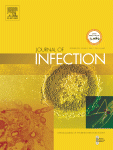In pathology, pathogenesis is the process by which a disease or disorder develops. It can include factors which contribute not only to the onset of the disease or disorder, but also to its progression and maintenance. The word comes from Ancient Greek πάθος (pathos) 'suffering, disease' and γένεσις (genesis) 'creation'.
In medicine, public health, and biology, transmission is the passing of a pathogen causing communicable disease from an infected host individual or group to a particular individual or group, regardless of whether the other individual was previously infected. The term strictly refers to the transmission of microorganisms directly from one individual to another by one or more of the following means:
Nocardiosis is an infectious disease affecting either the lungs or the whole body. It is due to infection by a bacterium of the genus Nocardia, most commonly Nocardia asteroides or Nocardia brasiliensis.

Nature Reviews Nephrology is a monthly peer-reviewed review journal published by Nature Portfolio. It was established as Nature Clinical Practice Nephrology in 2005, but change name in 2009. The editor-in-chief is Susan Allison.

AIDS is a peer-reviewed scientific journal that is published by Lippincott Williams & Wilkins. It was established in 1987 and is an official journal of the International AIDS Society. It covers all aspects of HIV and AIDS, including basic science, clinical trials, epidemiology, and social science. The editor in chief is Jay A. Levy. Eighteen issues are published annually.
The serial interval in the epidemiology of communicable (infectious) diseases is the time between successive cases in a chain of transmission.

Christopher Dye FRS, FMedSci is a biologist, epidemiologist and public health specialist. He is Professor of Epidemiology at the University of Oxford and formerly Director of Strategy at the World Health Organization.
Clinical Infectious Diseases is a peer-reviewed medical journal published by Oxford University Press covering research on the pathogenesis, clinical investigation, medical microbiology, diagnosis, immune mechanisms, and treatment of diseases caused by infectious agents. It includes articles on antimicrobial resistance, bioterrorism, emerging infections, food safety, hospital epidemiology, and HIV/AIDS. It also features highly focused brief reports, review articles, editorials, commentaries, and supplements. The journal is published on behalf of the Infectious Diseases Society of America. The editor-in-chief is infectious disease physician Paul Sax.
BMC Veterinary Research is a peer-reviewed open access veterinary science and medical journal that launched in 2005 published by BioMed Central. Part of the BMC Series of journals, it has a broad scope covering all aspects of veterinary science and medicine, including the epidemiology, diagnosis, prevention and treatment of medical conditions of domestic, farm and wild animals, as well as the biomedical processes that underlie their health.
BMC Public Health is a peer-reviewed open-access scientific journal that covers epidemiology of disease and various aspects of public health. The journal was established in 2001 and is published by BioMed Central.
Archives of Disease in Childhood is a peer-reviewed medical journal published by the BMJ Group and covering the field of paediatrics. It is the official journal of the Royal College of Paediatrics and Child Health.
Sexually Transmitted Infections is a peer-reviewed medical journal that publishes original research, descriptive epidemiology, evidence-based reviews and comment on the clinical, public health, translational, sociological and laboratory aspects of sexual health, HIV and AIDS, from around the world. It also publishes educational articles, letters, a blog and podcasts.
The Journal of Epidemiology and Community Health is a monthly peer-reviewed public health journal that covers all aspects of epidemiology and public health. It is published by the BMJ Group.

The Journal of Infection is a monthly peer-reviewed medical journal in the field of infectious disease, covering microbiology, epidemiology and clinical practice. Established in 1979, the journal was initially published quarterly by Academic Press. The first editor was Hillas Smith. The Journal of Infection is the official publication of the British Infection Association. Since 2006, the editor-in-chief has been Robert C. Read and the publisher is Elsevier.
Infection, Genetics and Evolution, Journal of Molecular Epidemiology and Evolutionary Genetics of Infectious Diseases is a peer-reviewed scientific journal established in 2001. It is published by Elsevier. The (founding) editor-in-chief is Michel Tibayrenc. Topics covered include genetics, population genetics, genomics, gene expression, evolutionary biology, population dynamics, mathematical modeling, and bioinformatics.

The Journal of Veterinary Diagnostic Investigation is an international peer-reviewed academic journal published bimonthly in English that publishes papers in the field of Veterinary Sciences. The journal's editor is Grant Maxie. The Journal has been in publication since 1989 and is currently published by SAGE Publications in association with American Association of Veterinary Laboratory Diagnosticians, Inc.
The Journal of Hospital Infection is a peer-reviewed medical journal published by Elsevier on behalf of the Healthcare Infection Society. The journal publishes articles describing original research on epidemiology, healthcare, and antimicrobial resistance.
The American Journal of Infection Control is a peer-reviewed scientific journal published by Elsevier on behalf of the Association for Professionals in Infection Control and Epidemiology. The journal publishes articles describing original research on the epidemiology, infection control, and infectious diseases. According to the 2020 Journal Citation Reports, the journal has a 2023 impact factor of 4.9.
Clinical Microbiology and Infection is a monthly peer-reviewed medical journal covering management of patients and the prevention of infectious diseases including research in clinical microbiology, infectious diseases, bacteriology, mycology, virology, and parasitology, including immunology and epidemiology as related to these fields. The journal also publishes editorials, commentaries, and reviews, as well as guidelines originating from European Society of Clinical Microbiology and Infectious Diseases study groups.
Azra Catherine Hilary Ghani is a British epidemiologist who is a professor of Infectious Disease Epidemiology at Imperial College London. Her research considers the mathematical modelling of infectious diseases, including malaria, bovine spongiform encephalopathy and coronavirus. She has worked with the World Health Organization on their technical strategy for malaria. She is associate director of the MRC Centre for Global Infectious Disease Analysis.






